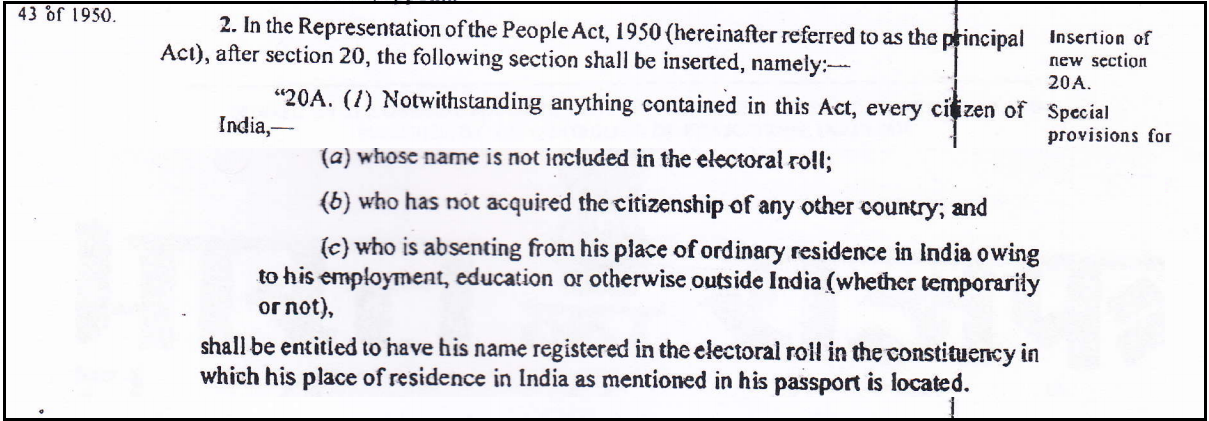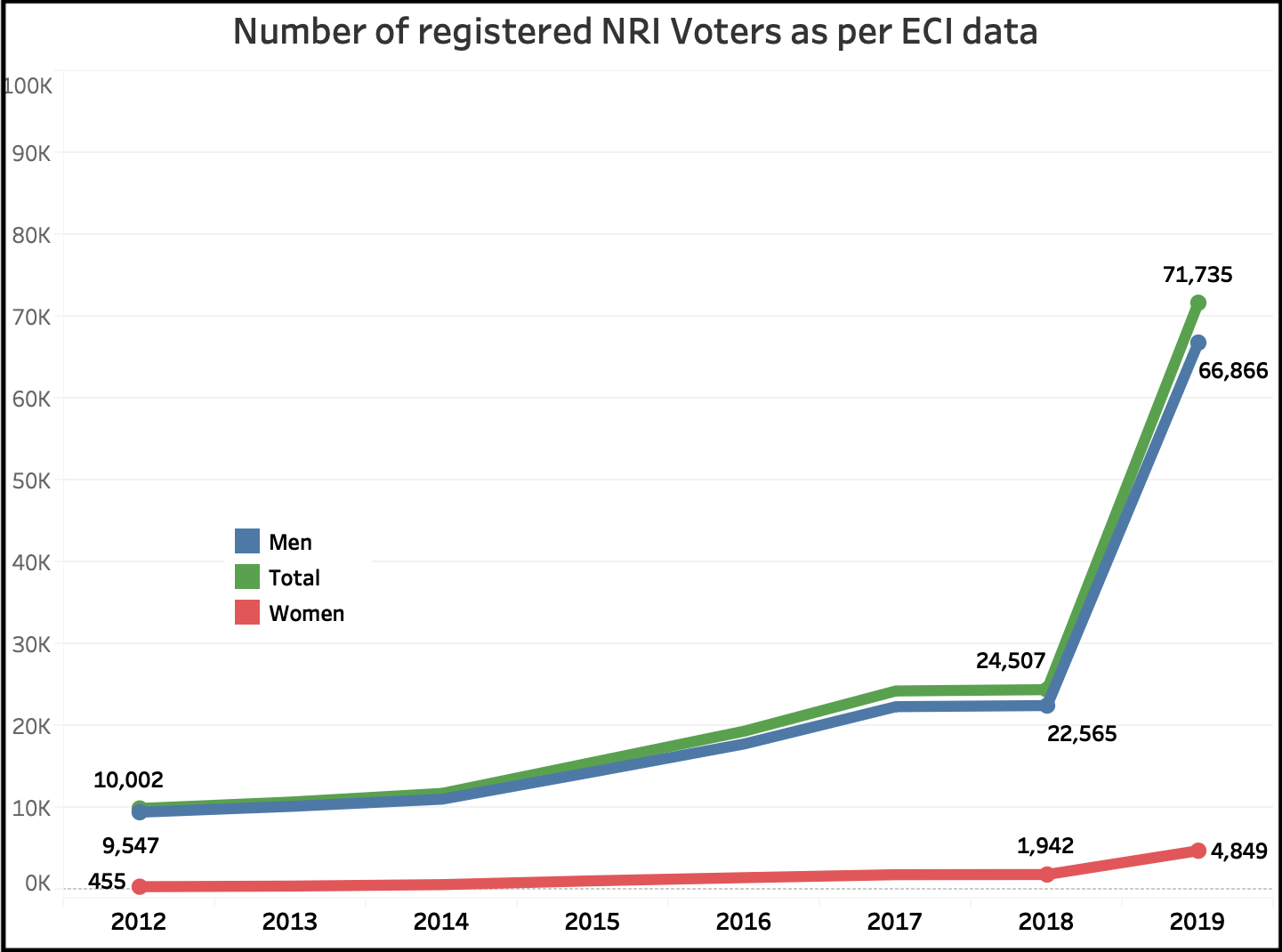[orc]The Representation of People Act, 1950 (RP Act) was amended in the year 2010 that made special provisions for Indian Citizens living abroad to get enrolled as a voter. Of the more than 1.31 crore NRIs who are eligible, less than 1% (only 71735) have registered as voters as per the latest electoral roll published by the ECI in early 2019.
The Representation of People Act, 1950 (RP Act) was amended in the year 2010 that made special provisions for Indian Citizens living abroad to get enrolled as a voter. Ever since, the Election Commission of India (ECI) has been trying to promote voter registration among NRIs. But the data released by the ECI paints a very grim picture of the interest among NRIs. Of the more than 1.31 crore NRIs, less than 1% (only 71735) have registered as voters as per the latest electoral roll published by the ECI in early 2019.
History of NRI Voting rights
Following demands from various NRI groups, the provisions of the RP act were amended in the year 2010. This amendment inserted a new section 20A to enable NRIs (citizens of India residing outside India) to get enrolled as a voter. It is to be noted that the NRIs should not have acquired citizenship of any other country. All such eligible ones can register in their place of residence in India.

This amendment was followed by change of rules that defined procedures for NRIs to get enrolled. NRIs can register themselves online on the National Voters’ Service Portal (NVSP). In addition to other details, they are supposed to submit the details of their passport & VISA of the country they are living in.
Hardly any improvement in 8 years
The ECI started publishing data on NRI (Overseas) voters from the year 2012. As per the 2012 data, a total of 10002 were registered as NRI voters. This number increased to only 24507 in 2018. Of the 24507 registered as per the 2018 roll published by the ECI, only 1942 are women (less than 10%) while the rest are men. This number however has almost tripled as per the 2019 roll published recently. From 24507 in 2018, the number of NRI voters increased to 71735 in 2019. The number of Women NRIs registered as voters remains at less than 10% even in 2019. For the first time in 2019, twenty (20) NRIs of the third gender also registered as voters.
While it looks like the number of such NRI voters has increased to 7 times in these 8 years, it is a minuscule number compared to the total number of NRIs. As per the data published by the Ministry of External Affairs (MEA), more than 1.31 crore NRIs are living in various parts of the world. Compared to this number, the number of registered NRI voters is less than 1%, in fact less than 1 registered for every 180 NRIs.
 More than 92% of the registered from Kerala
More than 92% of the registered from Kerala
Of the various states where the NRIs are registered, Kerala has led right from the year 2012. Out of the 10002 registered in 2012, 9838 were registered in Kerala. All the other states/UTs together accounted for only 164. In other words, more than 98% of the NRIs who registered themselves as voters in India in 2012 had done so in Kerala. As of 2019, a total of 66584 NRIs registered in Kerala compared to 5151 who registered in the rest of India, making it a total of 71735. As of 2019, Andhra Pradesh (2511) & Telangana (1127) are the only two other states where more than 1000 NRIs registered as voters.
 Even as of 2019, NRI voters registered in Kerala accounted for more than 92% of all the NRI voters in the country.
Even as of 2019, NRI voters registered in Kerala accounted for more than 92% of all the NRI voters in the country.
 What are the possible reasons for such low registration?
What are the possible reasons for such low registration?
The low registration could be a result of multiple issues. Though the ECI has undertaken multiple awareness campaigns, they do not seem to have reached everybody. In addition, the cumbersome process could be another reason for lower registration. But the real issue could be the the voting methods available for such registered voters. As on date, the only way NRIs can actually vote is to be physically present during elections. A committee setup by the ECI had recommended proxy voting as a possible option of all the options explored by them. The Government had introduced an amendment to the RP act in December 2017, in the Lok Sabha, to enable such proxy voting. This amendment was passed by the Lok Sabha on 09th August 2018. But the bill is yet to be passed in the Rajya Sabha. Hence if NRIs would like to vote in the upcoming 2019 Lok Sabha elections, they have to be physically present at the place of registration on the day of the poll. In fact, the ECI has dismissed rumours that NRI voters can vote online. No such facility exists as on date.
Only 8 NRI voters voted in 2014 LS Elections
As per the data released by the ECI, only 8 NRI voters voted in the 2014 Lok Sabha elections out of 13039 registered by then. Four (4) of them voted in Gujarat, 1 in Rajasthan, 1 in West Bengal and the remaining 2 in Chandigarh. In other words, less than 0.1% of the registered NRI voters actually voted.
Parties differ on allowing proxy voting for NRIs
The debate on the amendment to the RP act went on for an hour and thirteen (1 hr and 13 minutes) in the Lok Sabha. Twelve members from various parties participated in the debate. There were divergent views on allowing proxy voting for NRIs.
R Gopalakrishnan (AIADMK): He felt that proxy voting could be misused since even close friends and family members have their own voting preferences and there is no guarantee that the proxy will vote for a candidate preferred by the NRI. He also felt that proxy voting could lead to vote trading. He suggested that the government should extend foolproof online voting for NRIs or voting through the Indian embassies instead of proxies.
Rajiv Pratap Rudy (BJP): He welcomed the move and asked the government to further extend facilities to voters within India who live outside their constituency. He suggested that the ECI could look at setting up special polling booths outside the constituency if there are more than 100 voters.
Dr. Mamtaz Sanghamita (TMC): She also raised the issue of the proxy not voting as per the original voter’s preference and how migrant voters are not allowed to vote by proxy. She also did not agree with the Minister that this is a simple amendment. She concluded by saying it is an irregular bill and the government should think twice before implementing the provisions of the bill.
Anandrao Adsul (Shiv Sena): He raised some basic questions as to how the concept of ‘one person, one vote’ will be violated if the same person is chosen as proxy by multiple voters. He also sought to know this is going to implemented in practice. While supporting the bill, he asked the government to look into the practical issues.
Kalikesh N. Singh Deo (BJD): He felt that that the amendment is not fully thought out and raised multiple issues like ‘One person – one vote’, accuracy of NRI voter registration etc. He went onto say that an individual’s choice of vote will be violated if the proxy does not vote based on the choice of the voter and the secrecy of the voting process will get vitiated. He asked the government to explore e-voting instead of proxy voting while supporting the amendment.
Konda Vishweshwar Reddy (TRS): He said that while the principle behind the bill is very correct, the path is not. He felt that the premise of the bill is like all NRIs are honest people and all Indians living in India are dishonest because the proxy mechanism might lead to sale of votes. He suggested that the proxy should only be a blood relative. While he agreed with the principle behind the bill, he did not agree with methodology, the technology and the procedure used. He asked the government to explore e-voting.
Mohammad Salim (CPI(M)): He said while it looks like a simple amendment, it is not and such important decisions are being rushed through. He raised the issue of migrant labour and also mentioned about how voting in other country elections happens through embassies. He supports the voting rights to NRIs, but not by proxies.
Dharam Vira Gandhi (AAP): He said that he supports voting rights to NRIs, but not by proxy voting. He felt proxy voting is like bogus voting. He suggested that e-voting is an ideal alternative for allowing NRIs to vote.
Prem Singh Chandumajra (SAD): He said it is a very good bill and supports it whole heartedly while mentioning that 40% Punjabis live outside the country. He also supported the issues raised by the other members about the voting issues of internal migrants.
Dushyant Chautala (INLD): He raised many issues concerning the entire process including the authenticity of approving proxies. He said for military and other service personnel, the proxy is approved by a higher authority which may not be the case with NRIs. He asked that the bill be sent to the standing committee.
Kunwar Haribansh Singh (Apna Da): He supported the bill whole heartedly while saying that the process & procedure should be transparent so that proper voting takes place.
Jayadev Galla (TDP): He wanted to know about e-voting.
The bill was passed by voice vote. But the common issues raised by members across the political spectrum were about the sanctity and probable misuse of the proxy voting and why such proxy voting cannot be extended to internal migrants. Quite a few members suggested other measures such as e-voting and voting at embassies be explored. How the government plans to enable proxy voting on ground without allowing any misuse remains to be seen.


